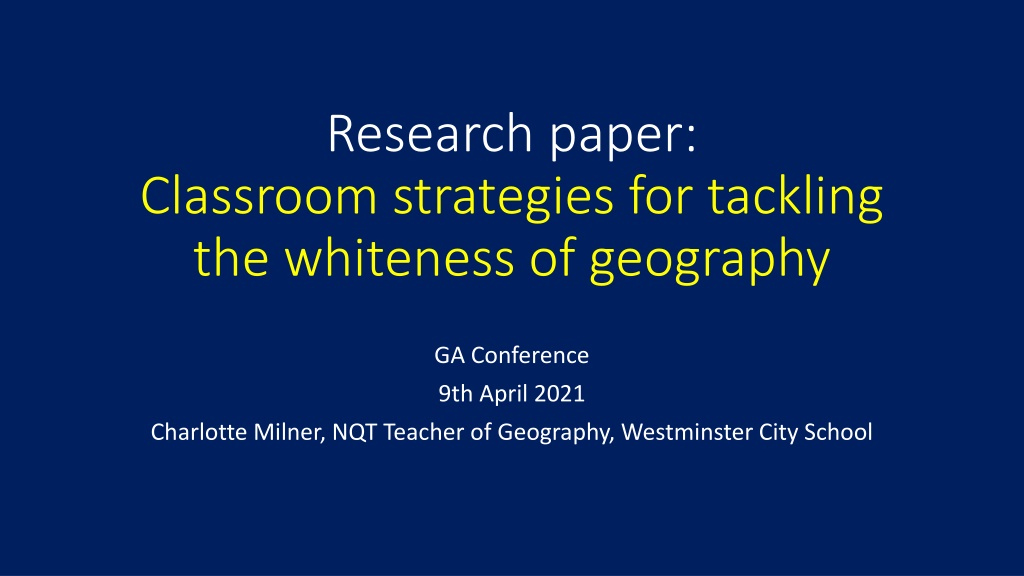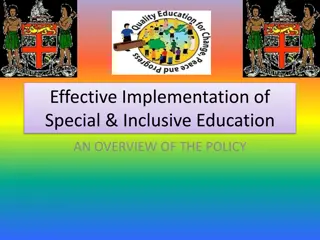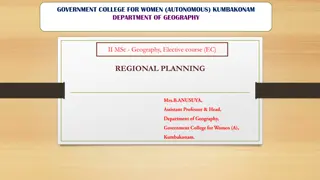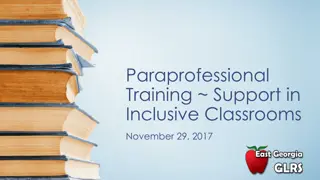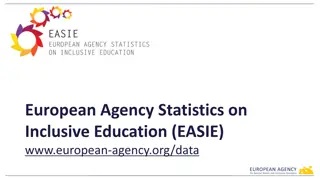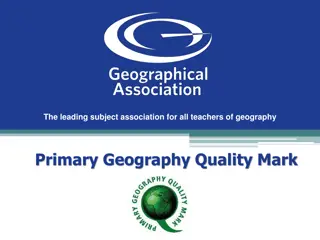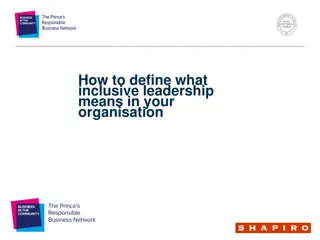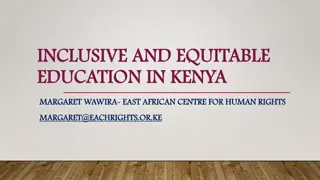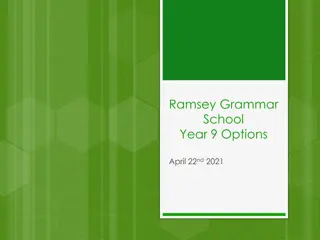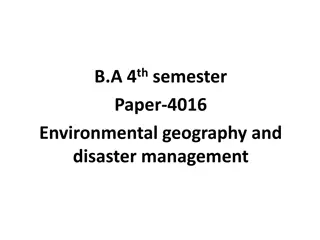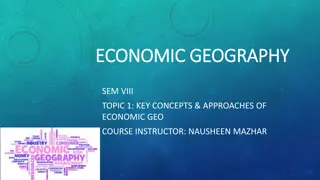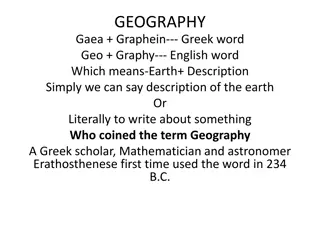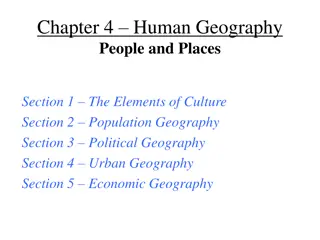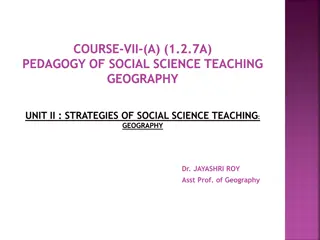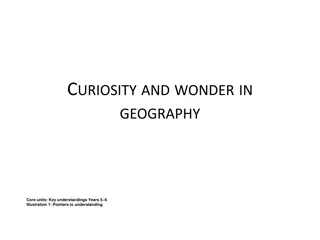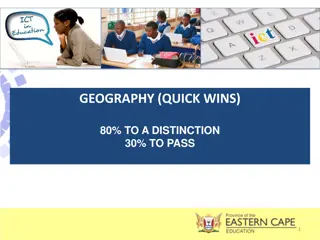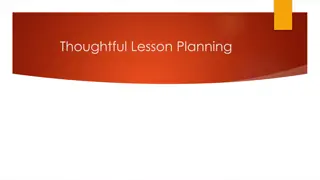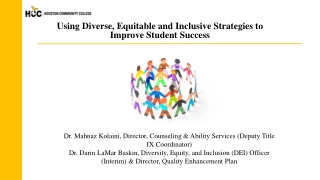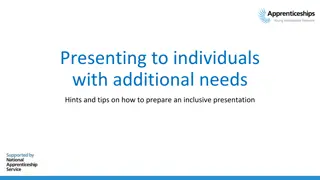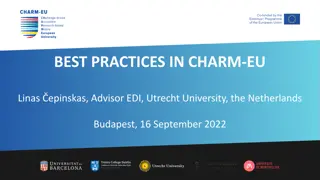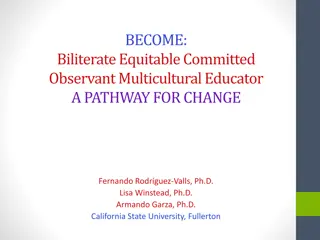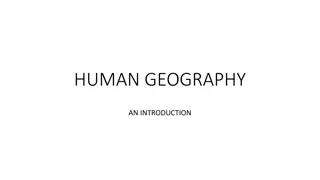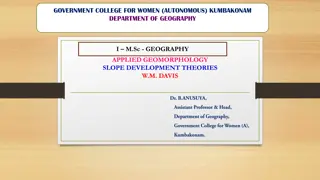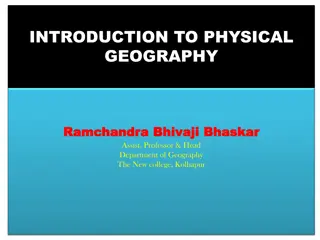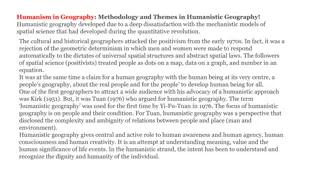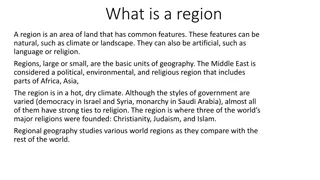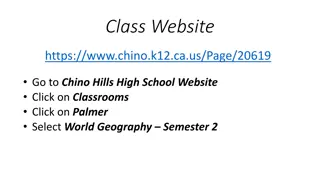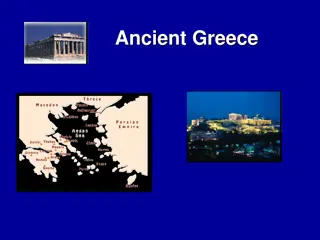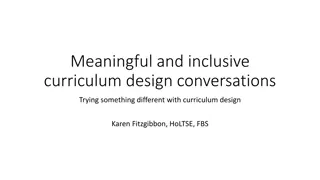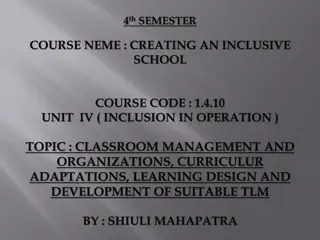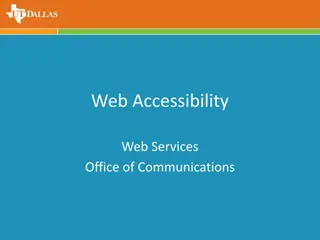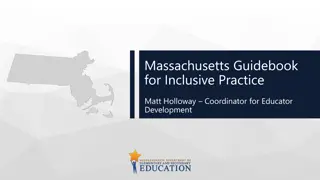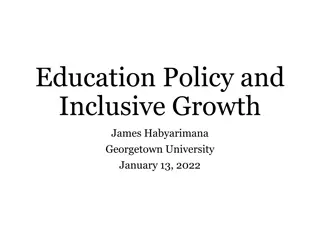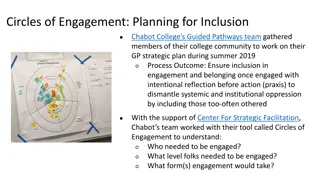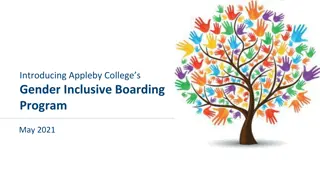Strategies for Inclusive Geography Education
Research paper by Charlotte Milner explores strategies to address the whiteness in geography education, discussing issues of systemic racism, lack of diversity, and strategies to tackle these issues through inclusive teaching methods and perspectives.
Download Presentation

Please find below an Image/Link to download the presentation.
The content on the website is provided AS IS for your information and personal use only. It may not be sold, licensed, or shared on other websites without obtaining consent from the author. Download presentation by click this link. If you encounter any issues during the download, it is possible that the publisher has removed the file from their server.
E N D
Presentation Transcript
Research paper: Classroom strategies for tackling the whiteness of geography GA Conference 9th April 2021 Charlotte Milner, NQT Teacher of Geography, Westminster City School
Origins of the research Origins PGCE assignment (2020): tangible interventions to make geography more inclusive Overwhelmingly white cohort on PGCE (IOE, London) and undergraduate degree (University of Manchester) I teach diverse groups of pupils of different ethnicities Research paper: Classroom strategies for tackling the whiteness of geography (Milner, 2020)
Rationale Persistent whiteness of geography and systemic racism in knowledge production Whiteness = social discourse in which white identifications and interests are a socially constructed and constantly reinforced power (Gillborn, 2005: 488). Normalised white experiences include studying and undertaking fieldwork in racialised and profoundly white locations in the British countryside (Hughes, 2016; Panelli et al., 2009: 355). Geography is a social construct influenced by positionality Lack of socio-ethnic diversity in geography = world is reflected through a limited range of perspectives (Winter, 2018). Powerful knowledge problematic = assumes better knowledge than that obtained in everyday life, lived experiences. Research paper: Classroom strategies for tackling the whiteness of geography (Milner, 2020)
Methodology Semi-structured interviews 3 Geography teachers based in London and Sheffield. The participants identified as Black Caribbean British, British Indian, and British Chinese. Interviews designed to gather experiences of geography, as a student and as a teacher, and opinions Inclusion of ethnic minority geographers critical: Understanding matters of racism (Solorzano, 1997: 7). Existing lack of representation within knowledge production processes Analysis identified: Three significant issues (lack of ethnic minority teachers omitted from further discussion) Four significant strategies for tackling issues Significant : frequent occurrence across the interviews; perceived impact on children and their experiences of geography. Research paper: Classroom strategies for tackling the whiteness of geography (Milner, 2020)
Issue 1 Representation of countries Respondents' experiences of other countries not in line with classroom content One felt disconnect being introduced to certain places as developing etc., but my personal experience of visiting those places was totally different so it didn tmarry . being low income, Natural logical and indisputable categories/rankings (Winter, 2018: 461). Categorising countries by development Process of naturalisation: white becomes the norm from which other races stand apart (Gillborn, 2005: 489). Respondent: Kids with the heritage, they feel a bit put out Respondent: I started to sort of categorise myself . African countries classified as underdeveloped (Winter, 2018: 464) Alienate and disrespect students in the classroom (Winter, 2018). Research paper: Classroom strategies for tackling the whiteness of geography (Milner, 2020)
Issue 2 Lack of exposure to other places Potential implications for attainment (Hughes, 2016). Respondent: on their PGCE course when other trainees were talking about different parts of the UK like the Lake District or parts of Wales, mountainous places, places where you go camping or on UK holidays, I felt awkward because I hadn t been exposed to those kinds of places . Rural locations are racialised spaces. Less exposure to rural areas where physical processes are observed. Ethnic minority people often experience racism in various forms (Hughes, 2016; Chakraborti and Garland; 2004). Ethnic minority pupils may approach, understand and experience the study of these locations differently from their white British classmates (Hughes, 2016). Respondent: felt like I was being watched like I was really out of place in rural settings. Research paper: Classroom strategies for tackling the whiteness of geography (Milner, 2020)
Strategy 1 Increase the number of field trips carried out BUT how do we improve field trip experience? Costs and COVID Increase number of field trips carried out Requires attention and cooperation of a range of institutions and bodies. Much of literature aimed at HE geography and not applicable to school geography Sensitive and appropriate approach to preparation, undertaking and debriefing of fieldwork required (Abbott, 2006). Very little literature on improving ethnic minority pupils experiences of fieldwork. Research paper: Classroom strategies for tackling the whiteness of geography (Milner, 2020)
Strategy 2 Diversifying knowledge in the classroom Embedding range of voices, including marginalised e.g. indigenous voices Acknowledging, utilising and respecting pupils everyday knowledge Diversifying knowledge in the classroom What if the classroom demographic is totally or largely white? Diversity of pupils= rich and diverse range of positionalities present in the learning process (Wellens et al., 2006). Integral; culturally responsive (Gay, 2018) Never tokenistic, forced or white-serving Research paper: Classroom strategies for tackling the whiteness of geography (Milner, 2020)
Strategy 3 Broader use of a single case study More balanced and detailed understanding of the country = increasing capacity for engaging with the case study and thinking critically and creatively (Adichie, 2009; Roberts, 2013; Biddulph et al., 2015; Taylor, 2009). Respondents proposed using a variety of case studies . Broader use of single case study BUT difficult to study many places at a meaningful level (Roberts, 2013). E.g. Nigeria to study rivers, coasts, urbanisation, population, migration, climate change it is represented as multifaceted Research paper: Classroom strategies for tackling the whiteness of geography (Milner, 2020)
Strategy 4 Racialisation as a fundamental aspect of geographical understanding Racialisation = consequences of the construction of race as a means of differentiating and valuing white people above those of colour (Kobayashi and Peake, 2000: 400) Transform the way in which students understand the world (Roberts, 2017: 6). Racialisation as a fundamental aspect of geographical understanding Critical understanding of a contemporary issues (Noxolo, 2017). Geography played key role in the naturalisation of racial difference (Kobayashi and Peake, 2000: 399). Critical examination of historical and contemporary responsibility for marginalisation and subordination of other , e.g. through the legitimation of neo-colonial concepts and practices, such as aid and development. Research paper: Classroom strategies for tackling the whiteness of geography (Milner, 2020)
Pedagogy Using critical enquiry Probe beneath the surface (Roberts, 2013: 125) through questioning and challenging status quo. Pupils develop critical awareness of reality necessary for tackling issues around misrepresentation (Roberts, 2013). Enable pupils to make use of experiential knowledge (Roberts, 2013: 8). Research paper: Classroom strategies for tackling the whiteness of geography (Milner, 2020)
Limitations Ethnic minority pupils not included in the research. Small scope of research = limited possible range of experiences and issues for discussion. Use of BAME = homogenises different ethnic minority groups and overlooks specific experiences of different ethnic minorities. Research paper: Classroom strategies for tackling the whiteness of geography (Milner, 2020)
Applying strategies to practice Year 8 Population Year 10 Urban Issues and Challenges (AQA unit) Year 11 Changing Economic World (AQA unit) Links between slavery and Rio s favelas and the people who live in them. Colonial links to most common birth countries in London (Nigeria, Pakistan, India, Jamaica). Critical examination of the Demographic Transition Model (Western model of development and demographic change). Examining causes of uneven development with shift in focus towards colonialism/neocolonialism. Critical examination of the Brandt line as a tool of racial division. Social inequality in London explicitly examined racial inequality (housing and income inequality) using Runnymede Trust data. Creating own resources = Mohamed s migration story challenging stereotypes Alternative measurements of development such as the GINI- coefficient. Using Misty (Arinze Kene) play script to explore Black perspective of urban regeneration. Links between urban spaces and cultural identity (e.g., how Grime is shaped by urban landscape of London) Introducing case study of Nigeria - what do we know and how do we know it? Environmental racism and air pollution Research paper: Classroom strategies for tackling the whiteness of geography (Milner, 2020)
Thank you Charlotte.milner.19@alumni.ucl.ac.uk https://twitter.com/charmilner_
References list Abbott, D.(2006), Disrupting the whiteness of fieldwork in geography, Singapore Journal of Tropical Geography, 27: 326-341. doi:10.1111/j.1467-9493.2006.00265.x Alexander, R. (2011) Towards Dialogic Teaching: Rethinking classroom talk (4th edition). York: Dialogos Biddulph, M., Lambert, D. and Balderstone, D. (2015) Learning to Teach Geography in the Secondary School, Routledge Binns, J. A. (2020) Is Africa Developing? Challenging some popular perspectives, Geographical Association E-Conference 18th April 2020 Chakraborti, N. & Garland, J. (2004), Rural Racism, Cullompton: Willan Cohen, L. Manion, L. and Morrison, K. (2011) Research Methods in Education, pp. 559-573, Taylor & Francis Group, London Daniels, P., Sidaway, J., Bradshore, M. and Shaw, D. (2012) An Introduction to Human Geography. Harlow: Pearson Education. Department for Education (2013) Geography programmes of study: key stage 3, National curriculum in England, https://assets.publishing.service.gov.uk/government/uploads/system/uploads/attachment_data/file/239087/SECONDARY_national_curriculum_-_Geography.pdf (accessed 6th June 2020) Department for Education (2014) Geography: GCSE subject content, https://assets.publishing.service.gov.uk/government/uploads/system/uploads/attachment_data/file/301253/GCSE_geography.pdf (accessed 9th May 2020 Desai, V. (2017) Black and Minority Ethnic (BME) student and staff in contemporary British Geography, Area 49.3, 320-323 doi: 10.1111/area.12372
Dunne, M., Pryor, J. and Yates, P. (2005) Becoming a Researcher, A companion to the research process, Conducting Educational Research series, Open University Press, Berkshire, England Easterly, W. (2009) How the Millennium Development Goals are unfair to Africa, World Development, 37(1), pp.26-35. Eddo-Lodge, R. (2018) Why I m No Longer Talking to White People About Race, Bloomsbury Publishing, London. Elliott-Cooper, A.(2017) Free, decolonised education : a lesson from the South African student struggle, Area 49.3, 332-334, doi: 10.1111/area.12375 Esson, J. and Last, A. (2019) Learning and teaching about race and racism in geography, in Handbook for Teaching and Learning in Geography, Cheltenham, UK: Edward Elgar Publishing Flahaux, M. and De Haas, H. (2016) African migration: trends, patterns, drivers, CMS 4, 1 doi:10.1186/s40878-015-0015-6 Freire, P. (1970) Pedagogy of the Oppressed, New York: Seabury Press Garcia, H. (2018) Does Geography have an image problem? Exploring the perceptions and attitudes of minority ethnic groups towards geography education, CPASGF41A1718 Geography Education Dissertation with Integrated Research Methods. Unpublished essay Gay, G. (2018) Culturally Responsive Teaching: Theory, Research, and Practice. 3rd ed New York: Teachers College, 2018. Print. Multicultural Education Ser. Gillborn, D. (2005)Education policy as an act of white supremacy: whiteness, critical race theory and education reform, Journal of Education Policy, 20:4, 485-505, DOI: 10.1080/02680930500132346 Hughes, A. (2016) Exploring normative whiteness: ensuring inclusive pedagogic practice in undergraduate fieldwork teaching and learning, Journal of Geography in Higher Education, 40:3, 460-477, DOI 10.1080/03098265.2016.1155206 Hughes, A. and McDuff, N. (2019) Inclusive teaching and learning practices in geography, in Handbook for Teaching and Learning in Geography, Cheltenham, UK: Edward Elgar Publishing Kobayashi, A. and Peake, L. (2000) Racism out of Place: Thoughts on Whiteness and an Antiracist Geography in the New Millennium, Annals of the Association of American Geographers, 90:2, 392-403, DOI: 10.1111/0004-5608.00202 Kothari, U.(2006) Critiquing race and racism in development discourse and practice, Progress in Development Studies 6, 1, pp. 1-7, https://journals.sagepub.com/doi/pdf/10.1191/1464993406ps123ed (accessed 26th May 2020) Lam, C., Aylwin, C. and Khan, M. (2019) Are paediatric stabbings in London related to socioeconomic status?, Trauma, 21(4), pp. 310 316. doi: 10.1177/1460408618789967. Lambert, D. and Morgan, J. (2011) Geography and Development: Development Education in Schools and the Part Played by Geography Teachers, available at: https://discovery.ucl.ac.uk/id/eprint/1566715/1/GeographyReport%202.pdf Lander, V. (2011) Race, culture and all that: an exploration of the perspectives of White secondary student teachers about race equality issues in their initial teacher education, Race Ethnicity and Education, 14:3, 351-364, DOI: 10.1080/13613324.2010.543389
Maude, A. (2016) What might powerful geographical knowledge look like? Geography, Vol. 101, No. 2 (Summer 2016), pp. 70-76 Published by: Geographical Association Stable URL: https://www.jstor.org/stable/10.2307/26546719 Mesie, J. (2019) Knife crime: briefing paper, Coram Impact and Evaluation, https://www.coram.org.uk/sites/default/files/Knife%20Crime%20Briefing%20Paper%20-%20Dr%20Jeff%20Mesie.pdf (accessed 9th May 2020) Michelmore, O., Lawrence, H., Borjes, E. and Taylor, S. (2019), Young people s views on knife crime, Coram, https://www.coram.org.uk/sites/default/files/YoungPeoplesViewsonKnifeCrime.pdf (accessed 3rd May 2020) Milner, C. (2020) Can the teaching of geographical issues relating to population develop critical consciousness?, Subject Studies CPAS0022 Developing Teaching and Learning. Unpublished essay. Noxolo, P. (2017) Introduction: Decolonising geographical knowledge in a colonised and re-colonising postcolonial world, Area 49.3, 317-319, doi: 10.1111/area.12370 Office for National Statistics (2019) People living in deprived neighbourhoods, UK Population by Ethnicity, available at: https://www.ethnicity-facts-figures.service.gov.uk/uk-population-by- ethnicity/demographics/people-living-in-deprived-neighbourhoods/latest (accessed 4th June 2020) Okolosie, L., Harker, J. and Dabiri, E. (2015) Is it time to ditch the term black, Asian and minority ethnic (BAME)?, The Guardian, Available at: https://www.theguardian.com/commentisfree/2015/may/22/black-asian-minority-ethnic-bame-bme-trevor-phillips-racial-minorities (accessed 3rd June 2020). Panelli, R., Hubbard, P., Coombes, B. & Suchet-Pearson, S. (2009) De-centring White ruralities: Ethnic diversity, racialisation and Indigenous countrysides, Journal of Rural Studies, 25, 355 364, doi:10.1016/j.jrurstud.2009.05.002 Richards, R. (2010) Not in my image. Personalisation and ethnic diversity in the classroom, from Teaching and Learning in Diverse and Inclusive Classrooms: Key issues for New Teachers, edited by Gill Richards and Felicity Armstrong, Routledge 2 Park Square, Milton Park, Abingdon, Oxon OX14 4RN Roberts, M. (2013) Geography through Enquiry: Approaches to Teaching and Learning in the Secondary School, Sheffield: Geographical Association. Print. Roberts, M. (2017) Geographical Education Is Powerful If..., Teaching Geography 42.1: 6-9. Web. Singleton, A. D. (2012) The geodemographics of access and participation in geography, The Geographical Journal 178, p.216-229, doi 10.1111/j.1475-4959.2012.00467.x Solorzano, D.G. (1997) Images and words that wound: Critical Race Theory, racial stereotyping, and teacher education, Teacher Education Quarterly, Vol. 24, No. 3, Seeking Tolerance and Understanding in Teacher Education (Summer, 1997) pp. 5-19
Taylor, E. (2009) GTIP Think Piece Concepts in Geography, Geographical Association Wellens, J., Berardi, A., Chalkley, B. Chambers, B., Healey, R., Monk, J. and Vender, J. (2006) Teaching Geography for Social Transformation, Journal of Geography in Higher Education, 30:1, 117-131, DOI: 10.1080/03098260500499717 Winter, C. (2018) Disrupting colonial discourses in the geography curriculum during the introduction of British Values policy in schools, Journal of Curriculum Studies, Vol. 50, No. 4, 456-475 Young, M.(2011) Discussion to Part 3 in Butt, G. (ed) Geography, Education and the Future. London: Continuum, pp. 181 3. Young, M. (2013) Powerful Knowledge: to what extent is this idea applicable to school geography?, Learning Through Enquiry seminar held at the Institute of Education on 15th May 2013 in London, UK, https://www.youtube.com/watch?v=r_S5Denaj-k (accessed 7th June 2020) Young, M. and Muller, J. (2013) On the powers of powerful knowledge, Review of Education Vol. 1, No. 3, pp. 229 250 DOI: 10.1002/rev3.3017
